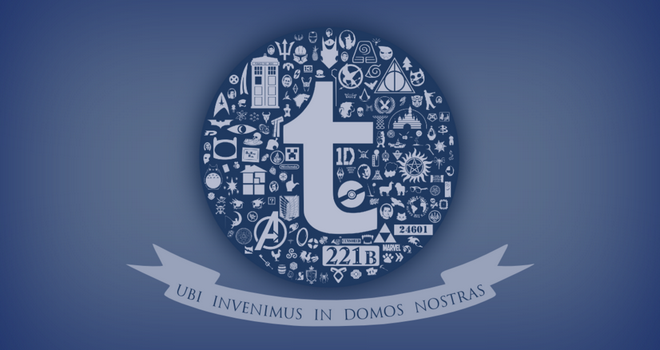 http://fandom-mused-fandom-games.tumblr.com
http://fandom-mused-fandom-games.tumblr.com
Features
Fractured Fandoms Find Their Footing
By: Emily Cross
A lot of critics and journalists have been categorizing the recent TV boom as a “Golden Age of Television,” usually referring to the level of storytelling that has been demonstrated. As much as I agree with that, I’d call this a Golden Age for a different reason. Two things managed to happen at the same time, most likely influenced by each other. There was the expansion of TV channels and streaming platforms and the rise of social media. Never in the history of television have we, as viewers, been so close to the media we consume. As good as this may sound, a lot of bad also comes along with it. Anyone who has witnessed ship wars on Tumblr can attest to this. Social media has grown to function as platforms for “group mind” mentalities, where one opinion is designated to be “correct” and anything that is different than that opinion is automatically wrong, no matter whose perspective it comes from. This mentality can be very damaging, not only to those who are expressing different opinions, but for fandom discourse at large.
But first, where does the “group mind” come from? Obviously, I don’t have all the answers, but here’s my theory. We all know that social media has grown to become part of our daily lives. Most of us can barely go a day without checking our Twitter feed, sending Snapchats or scrolling endlessly on Tumblr. The way social media is built promotes short messages, whether it is less than 140 character tweets or less than ten second Snapchats. Because we consume so many of these short messages every day, our brains have been trained to respond more favorably to shorter posts. I know that I continue scrolling when I see a longer text post on Tumblr, even if it would take less than five minutes to read. The focus on shorter posts means that someone’s complex opinions on a topic can get diluted down to one thought, which is then shared, retweeted and reblogged until somewhere along the way it becomes fact. We’ve all fallen victim to believing something to be true because we saw it on the Internet, not knowing that the “fact” could have easily started out as one person’s opinion.
So what does this “group mind” look like? In a lot of fandoms, it most often materializes as ship wars. Fans of Ship A think fans of Ship B are horrible, problematic and delusional while fans of Ship B think the same thing of fans of Ship A. It also presents as blogs like “Your Fave is Problematic,” which has fortunately not been active for two years, but has driven fandom discourse since its inception. The blog deconstructed any celebrity or person based on past “problematic” behaviors, whether or not the person in question apologized or grew since displaying that behavior. All of these “group mind” examples are marked by a distinct mindset that everything is either totally perfect, totally horrible and nothing exists in between. It’s easy to fall into this trap because falling on one side or the other of the good/bad spectrum is easy to comprehend; either you wholly love something or you wholly hate it. When something falls in the middle, it’s more complicated (and time-consuming) to sort out your feelings on each aspect of a person or piece of media, especially if you don’t know all the details.
So, my solution to fighting “group mind” mentality is simple, but may seem tough: acknowledge that there is a gray area between perfect and horrible and that most things lie in that gray area. Spend time parsing things out and figure out what things you (not Tumblr) like and dislike about something. Believe it or not, it is possible to recognize both the flaws and the strengths of a piece of media at the same time and still enjoy it. For example, “Game of Thrones” is often shamed for depicting a society with blatant and unforgiving rape culture and disrespect of women. I agree with that, but I also acknowledge that Arya, Daenerys, Sansa and Cersei are strong, complex layered women that we deserve to see on television. I watch “Game of Thrones” with a grain of salt, but I still love those characters and I’m allowed to. For the record, this advice goes for both sides of this: if you constantly idolize something, odds are that it isn’t perfect. If you constantly decry something, odds are that it has some positive aspects.
This brings me into my second solution (which might be more important): the Internet needs to stop policing what others watch and like. Everyone has a different reason for watching what they watch or liking what they like and all of those reasons are valid. Even if there is a show or person you’ve disavowed because of lack of diversity or treatment of the LGBT community or plot holes or problematic behaviors or literally anything else, I guarantee you there are still people who love that show or that person. They might be aware of the problems that caused you to stop watching or supporting and they might not, but I guarantee that there is something in the show or person that they love that either doesn’t appeal to you (and that’s okay) or you’re not aware of. Again, this goes for the other side as well. If you love something, but are blind to its faults, maybe consider listening to why people don’t like it. You may not end up agreeing with them, but it could be useful.
While we’re at it, if you’ve never even seen a show, but have heard of its misgivings please think twice before trashing it or writing off its viewers. My mom always used to tell me to never complain before I’ve tried something. She was usually referring to food, but it counts for TV, too. And if you have no desire to try it, just let it be. Let people enjoy things. I promise it won’t hurt because you have your own things to enjoy.
I’d also suggest one last thing that I have been seeing (especially in this post-Trump world of ours): take the energy you would expend yelling about ships on Tumblr and use it for something good. Participate in or host a fundraiser for a charity that works toward goals that you share, find rallies and protests in your area, contact your representatives about positive change in your country’s laws (which, like it or not, do affect the media), become a creator so that you can put out media you want to see or even just spread positivity about your passions. Your energy is precious, and it deserves to be put to good use.
Part of the beauty of humanity is that each of us is unique and has a unique perspective on what we consume. That’s why I think it’s so amazing that with our many platforms and shows, everyone can find a story that resonates with them individually. Sure, we are past the days when half of the country (literally) gathered around the TV set to watch the series finale of M*A*S*H. But how many people really saw themselves in the characters of M*A*S*H? A relatively small percentage. That doesn’t mean that stories like that were necessarily bad or unimportant, but it led to very broad storytelling with writers and producers trying to appeal to as many people as possible. That’s not necessarily true anymore. Everything is wide open and that gives me hope.





You must be logged in to post a comment Login